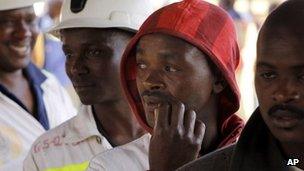South Africa gold miners on strike at Anglo
- Published

The strike comes a day after workers at the Marikana mine returned to work
Workers at a South African gold mine have begun a wildcat strike - the latest labour unrest in the country's vital mining industry.
The strikers at the Kopanang mine, which employs 5,000 staff, reportedly want their pay to more than double to 12,500 rand ($1,513; £935) a month.
The strike comes a day after miners at the Marikana platinum complex returned to work after reaching a pay deal.
An inquiry into the deaths of 46 people in Marikana will start on 1 October.
Justice Minister Jeff Radebe said that the families of the 34 people shot dead by police would be encouraged to attend and that it would be given four months to complete its work.
South Africa is one of the world's biggest producers of precious metals.
It holds 80% of the world's known platinum reserves and is the fourth largest gold exporter.
Some 15,000 workers employed by Gold Fields are already on strike.
About 15% of South Africa's gold production is affected by the industrial unrest, a South African mining analyst from Mineweb told the BBC.
'Setting precedent'
The latest industrial action began overnight at the Kopanang mine, south-west of Johannesburg.
"The night shift embarked on an unprotected strike... and the morning shift didn't go down either," said Alan Fine, a spokesman for the AngloGold Ashanti-owned mine.
It is believed that the mine accounts for about 20% of the company's production in South Africa.
The strikers' demands mirror those of the Marikana employees, who in the end settled for a much lower pay rise of 11-22% with their Lonmin owner.
South African Reserve Bank Governor Gill Marcus has expressed concern that the Marikana agreement could set a precedent for future wage demands in the mining sector, leading the inflation rate to rise from its current 5%.
Soldiers were deployed to the Marikana area over the weekend, after the government vowed to clamp down after nearly six weeks of unrest.
The shooting of the 34 miners was the most deadly police action since the end of white minority rule in 1994 and sparked a national outcry.
Ten people, including two police officers, had previously died during the protests.
Two more people have since died.
- Published20 September 2012
- Published18 September 2012
- Published12 September 2012
- Published8 September 2012
- Published13 September 2012
- Published24 August 2012
- Published23 August 2012